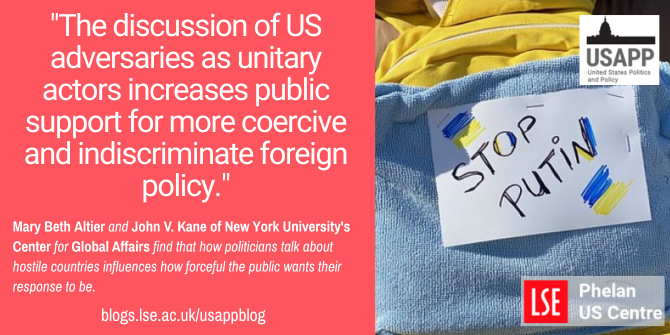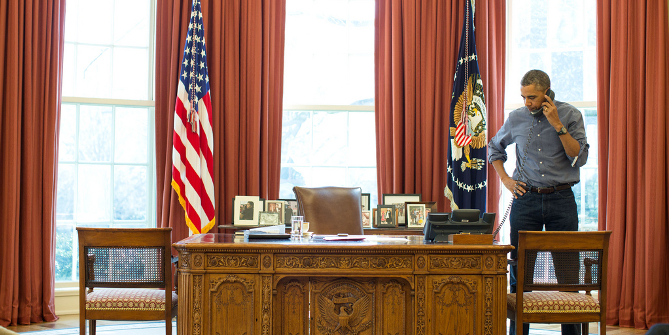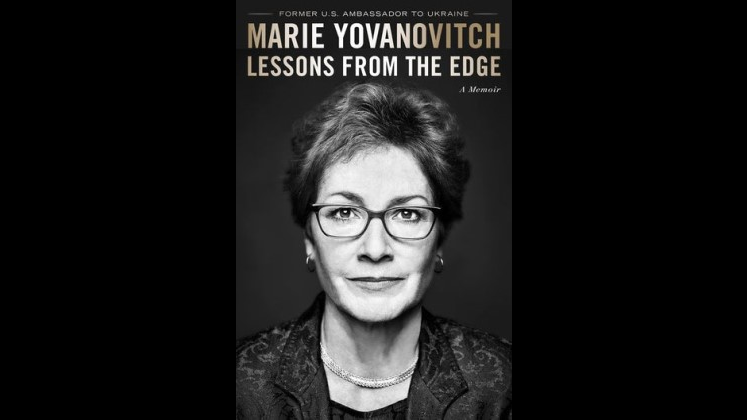
 When countries come into conflict, how politicians and the media talk about those on the other side matters for how members of the public think about the other country. In new research, Mary Beth Altier and John V. Kane find that when US politicians refer to other countries as a unified whole – rather than distinguishing a culpable leader or party – Americans are more likely to support more coercive and indiscriminate foreign policies such as sanctions and military strikes.
When countries come into conflict, how politicians and the media talk about those on the other side matters for how members of the public think about the other country. In new research, Mary Beth Altier and John V. Kane find that when US politicians refer to other countries as a unified whole – rather than distinguishing a culpable leader or party – Americans are more likely to support more coercive and indiscriminate foreign policies such as sanctions and military strikes.
To learn about international affairs, citizens often rely upon what politicians and media commentators are saying. One especially important aspect of such discussions is how they talk about foreign countries or states.
When referring to the threatening and egregious policies pursued by states, for example, politicians and commentators sometimes draw distinctions between the leaders, groups, or individuals responsible for such policies, on the one hand, and the wider civilian population, on the other. In other words, they acknowledge that not everyone within the foreign country necessarily supports what the government is doing.
Talking about opposing states as if they are individuals
Consider the current Russian war in Ukraine. Commentary highlights that Russians are divided in their support, that there have been mass protests against the war, and the role of state repression and state-controlled media and disinformation in sustaining Russians’ support for Putin. In his initial comments reacting to Russia’s invasion of Ukraine in February 2022, President Biden was careful to specify that, “President Putin has chosen a premeditated war that will bring a catastrophic loss of life and human suffering.”
But sometimes politicians and commentators are not so careful. That is, sometimes the actions of states are discussed as if those states were individuals – people with their own intentions, identities, personalities, and rationality. In a September 2022 address to the American people, for example, President Biden spoke of “Russia’s brazen effort to redraw the borders of its neighbor” noting “Russia is violating international law, trampling on the United Nations Charter, and showing its contempt for peaceful nations everywhere.”
This kind of language extends beyond Russia’s invasion of Ukraine. On Iran’s attempt to assassinate former National Security Advisor John Bolton on US soil last year, current National Security Advisor Jake Sullivan warned, “should Iran attack any of our citizens, to include those who continue to serve the United States or those who formerly served, Iran will face severe consequences.” President Trump used this same kind of language, particularly with respect to China. In his February 2020 State of the Union address, for example, he stated that “for decades, China has taken advantage of the United States.”
As these latter statements demonstrate, politicians regularly present states to the public as though they are unified, individual actors on the world’s stage. We refer to this type of framing as unitary actor framing.
But isn’t this just a simpler way of informing citizens about complex international affairs? What harm could come from it?
It turns out, potentially a lot. In new research, we sought to understand the effects of this kind of simplifying language on citizens’ foreign policy preferences. We found that unitary actor framing is common in elite speech and that these wording choices matter. Specifically, the discussion of US adversaries as unitary actors increases public support for more coercive and indiscriminate foreign policy.

“Madison protestors in support of Ukraine” (CC BY 2.0) by wort3/Chali Pittman/WORT News.
How we talk about other countries is important
In our study, we analyzed how politicians discussed the behavior of US adversaries in all State of the Union addresses and presidential debates between 1990 and 2018. Politicians talked about foreign countries as if these countries were individual people 64 percent of the time they were mentioned.
And unlike many other areas in politics, using unitary actor framing is a bipartisan endeavor: both the Republican and Democratic parties regularly employed unitary actor framing in most statements they made about US adversaries.
Given a wealth of social psychology research on perceptions of the degree to which members of a group are perceived to be alike, our study contends that the framing implicitly suggests that the individuals, groups, and entities within these states are relatively similar, and thus equally culpable for any wrongdoing. We therefore expected that the use of unitary actor framing by elites, whether intentional or not, to increase how unified the adversarial state is perceived to be, therefore, also support for more indiscriminate, coercive foreign policymaking.
This is precisely what we found. Across three experimental studies, with several thousand survey respondents, we show that unitary actor framing of US adversaries has a consistent and sizeable impact on US respondents’ willingness to support more coercive and indiscriminate policies against foreign countries. The more unified and cohesive a state is perceived to be, the more willing citizens are to indiscriminately punish citizens with broad economic sanctions and indiscriminate military strikes.
Taking down the temperature
Citizens’ willingness to use aggression or violence against a foreign country, in other words, can be influenced by the words that leaders use when discussing them. If not careful, citizens could consent to—and possibly even demand—foreign policies that take an enormous physical and economic toll on the innocent citizens of a country; citizens who have been mistakenly lumped together by American minds.
This point echoes research on how elite messaging about foreign countries can shift support for war. For example, one highly-cited study found that the use of frightening imagery involving terrorism can increase support for hawkish policies abroad. Such images can even be employed to garner greater favor from voters. The end result is that it becomes more difficult for voters to accurately perceive international affairs and, thus, makes it more difficult to hold officials accountable during elections.
Elected officials and influential voices in mass media need to be conscious of how they discuss foreign countries, especially when tensions are running high, and those countries are viewed by many citizens as adversaries. Taking a moment to distinguish the culpable leader, or government in power, from the country’s people can help citizens at home better see that “attacking all” is not a legitimate substitute for deterring or punishing those responsible.
- This article is based on the paper, ‘Framing States: Unitary Actor Language and Public Support for Coercive Foreign Policy’ in International Studies Quarterly.
- Please read our comments policy before commenting.
- Note: This article gives the views of the author, and not the position of USAPP – American Politics and Policy, nor the London School of Economics.
- Shortened URL for this post: https://bit.ly/3MTHyq9






